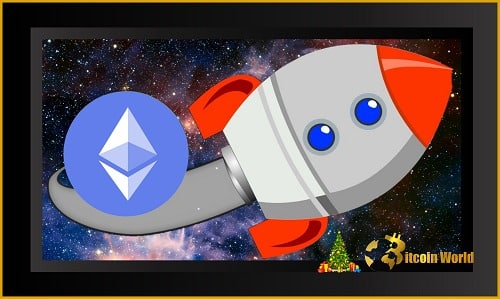Ethereum staking is heating up, and a new contender is rapidly gaining ground! Just weeks after its launch, Rocket Pool, a decentralized staking platform for Ethereum 2.0, has locked in over $350 million in total value locked (TVL). That’s a meteoric rise in the DeFi space, but what’s driving this explosive growth? Let’s dive into Rocket Pool and see why it’s making waves in the world of ETH staking.
Rocket Pool isn’t just another staking platform; it’s designed to shake things up. Its core mission is to democratize Ethereum 2.0 staking. How? By significantly lowering the entry barriers for both everyday stakers and node operators. Traditionally, running an Ethereum node required a hefty 32 ETH deposit (that’s around $119,000!). Rocket Pool slashes this requirement in half, allowing you to run a node with just 16 ETH (approximately $59,000). And for those who don’t have enough ETH to run a node, you can stake as little as 0.01 ETH and still earn rewards. This inclusive approach is a game-changer.
Rocket Pool vs. The Giants: How Does it Stack Up?
In the competitive arena of decentralized finance (DeFi) staking platforms, Rocket Pool is quickly climbing the ranks. According to DefiLlama data, it’s already secured the third spot with a TVL of $355.64 million (at the time of writing). Let’s see how it compares to the top players:
| Platform | TVL (USD) | Rank |
| Lido Finance | $6.04 Billion | 1 |
| Keep3r Network | $584.34 Million | 2 |
| Rocket Pool | $355.64 Million | 3 |
Lido Finance, the current king of DeFi staking, launched in December 2020 and boasts a massive TVL. However, despite its dominance in TVL, Lido operated with only 14 node operators as of Q4 2021. This is where Rocket Pool differentiates itself.
Decentralization: Rocket Pool’s Secret Weapon?
Rocket Pool proudly touts its decentralization as a key advantage. While Lido might have a larger TVL, Rocket Pool has a significantly larger and more distributed network of around 635 node operators. Why is this important? Decentralization is a core tenet of blockchain technology and cryptocurrencies like Ethereum. A more decentralized network is generally considered more secure, resilient, and resistant to censorship. Rocket Pool argues that its higher number of node operators contributes more meaningfully to Ethereum’s overall decentralization.
Looking at the numbers, around 67,000 ETH, worth over $252 million, has been staked through Rocket Pool. The remaining portion of its TVL comes from its native token, RPL. This indicates strong community confidence and participation in the platform.
Rocket Pool’s official launch on November 22nd followed a successful Beta phase two weeks prior. Even during the Beta, the platform demonstrated impressive growth, registering 237 node operators and a total of 1,088 staked Ether (ETH) in just 48 hours! This rapid uptake highlights the strong demand for decentralized and accessible Ethereum staking solutions.
What Makes Rocket Pool Stand Out? Key Features & Benefits
Rocket Pool’s appeal boils down to a few key selling points that resonate with both node operators and stakers:
- Decentralization: As we’ve discussed, Rocket Pool prioritizes a decentralized network, which is attractive to users who value the core principles of blockchain.
- Lower Barrier to Entry for Node Operators: The 16 ETH node requirement is significantly more accessible than the 32 ETH needed for solo staking or some other platforms. This opens up node operation to a wider range of participants.
- Liquid Staking Pool: Rocket Pool offers a liquid staking solution. When you stake ETH, you receive rETH tokens in return. rETH represents your staked ETH and accrued staking rewards. This is crucial because rETH is tradable and usable within the DeFi ecosystem, providing liquidity to staked ETH. You’re not locking up your ETH indefinitely; you can still participate in other DeFi activities while earning staking rewards.
- Competitive Commissions & Staking Incentives: Rocket Pool is designed to offer competitive staking rewards and commission structures, incentivizing both node operators and stakers to participate. The exact rates can vary, so it’s always best to check the platform for the most up-to-date information.
In essence, Rocket Pool aims to create a win-win scenario. It benefits stakers by providing accessible and liquid staking options, and it benefits node operators by lowering the ETH requirement and providing a platform to easily manage their nodes. Ultimately, it aims to contribute to a more robust and decentralized Ethereum network.

Related Posts – Bank DBS’s Crypto Business Grows Massively Due To Growing Demand From Investors
Is Rocket Pool a Threat to Lido Finance’s Dominance?
While Rocket Pool is making impressive strides, it’s still relatively early days. Lido Finance currently holds a significant lead in terms of TVL and market share. However, Rocket Pool’s emphasis on decentralization and its more inclusive approach to node operation could resonate strongly with the Ethereum community in the long run.
The Ethereum staking landscape is dynamic and evolving. As Ethereum 2.0 continues to develop, we can expect to see further innovation and competition among staking platforms. Rocket Pool has certainly positioned itself as a strong contender, offering a compelling alternative for those seeking decentralized and accessible ETH staking solutions. Whether it can truly challenge Lido’s dominance remains to be seen, but its rapid growth and unique value proposition make it a platform to watch closely in the exciting world of Ethereum and DeFi.
In Conclusion: Rocket Pool’s swift ascent in the Ethereum staking world is a testament to the growing demand for decentralized and user-friendly staking solutions. By lowering barriers and prioritizing decentralization, Rocket Pool is not just competing; it’s shaping the future of ETH staking. Keep an eye on this platform – it’s definitely one to watch as Ethereum 2.0 unfolds!
Disclaimer: The information provided is not trading advice, Bitcoinworld.co.in holds no liability for any investments made based on the information provided on this page. We strongly recommend independent research and/or consultation with a qualified professional before making any investment decisions.




